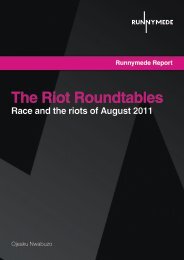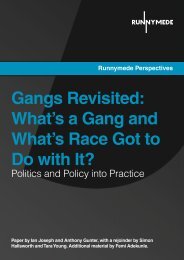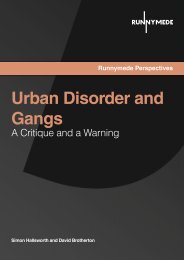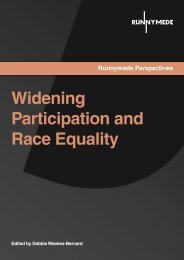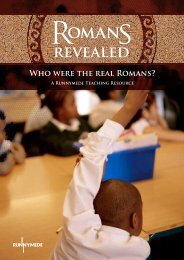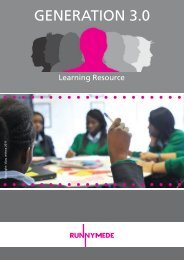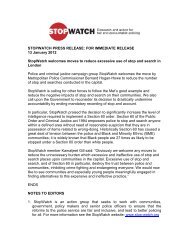PARENTINg - Runnymede Trust
PARENTINg - Runnymede Trust
PARENTINg - Runnymede Trust
Create successful ePaper yourself
Turn your PDF publications into a flip-book with our unique Google optimized e-Paper software.
feature<br />
Strategies in education for<br />
the black middle classes<br />
Visiting Research Associate at the Institute of Education, University of London, Nicola<br />
Rollock, reports on research carried out by herself and Professors Carol Vincent,<br />
Stephen Ball and David Gillborn, into the educational strategies of the black middle<br />
classes, a group that receives very little attention in British educational debates.<br />
Researchers at the Institute of Education,<br />
University of London, have recently<br />
published new research into the<br />
educational strategies of the black<br />
middle classes. We found, contrary to<br />
popular misconceptions that tend to<br />
position black families as disinterested in<br />
education, that these families prioritised<br />
education and were actively involved<br />
in their children’s schooling. Education<br />
represents, for many, a key means of both<br />
supporting their children to be socially<br />
mobile and, it is hoped, of acting as a<br />
possible barrier against racism in their<br />
children’s future. And, as our research<br />
found, racism is still a concern for many<br />
families, despite the relative advantages<br />
of their social class.<br />
Our research involved carrying out a<br />
series of qualitative semi-structured<br />
interviews with 62 parents who selfdefined<br />
as Black Caribbean. Fifteen of<br />
this original group were interviewed on a<br />
second occasion. This ethnic group was<br />
regarded as particularly relevant as a<br />
focus of study since evidence continues<br />
to indicate that black Caribbean pupils<br />
experience some of the lowest academic<br />
attainment compared with other ethnic<br />
groups. Furthermore, black Caribbean<br />
pupils from non-manual backgrounds<br />
are the lowest attaining of the middle<br />
class groups (Gillborn, 2008; Strand,<br />
2008). All parents were in professional or<br />
managerial occupations and had at least<br />
one child between eight and 18 years,<br />
age groups encompassing key transition<br />
points in children’s school careers.<br />
Fathers comprised 13 of the total sample.<br />
Findings revealed that black middle<br />
class parents used a range of strategies,<br />
including their class resources, to support<br />
their children through the education<br />
system. For example, they drew on their<br />
professional networks and contacts to<br />
access information or advice that might<br />
not be immediately forthcoming from<br />
the school. Many were also proactive in<br />
arranging meetings with teachers and<br />
tutors to discuss their children’s progress.<br />
Some parents reported that teachers were<br />
surprised by such displays of initiative and<br />
were baffled and surprised by parents’<br />
knowledge about the education system.<br />
One parent described how her son’s tutor<br />
interrupted a discussion they were having<br />
about the university admission process,<br />
during which she had pulled from her<br />
bag the Sunday Times list of the top<br />
100 universities, to interrogate her about<br />
what she did for a living. Such incidents<br />
were not unusual; black middle class<br />
parents often found they were compelled<br />
to actively demonstrate their knowledge<br />
about education, their interest or their<br />
capability as parents to white teachers<br />
and other school staff to increase the<br />
likelihood of being treated as equals.<br />
Many parents were frustrated at the<br />
low expectations that school staff held<br />
towards their children, levels which were<br />
perceived by the school to be acceptable<br />
and therefore not challenged:<br />
“... in the final year the expectations from<br />
some of his teachers ... [one] said ‘Well<br />
you got a pass, so what more do you<br />
want? We weren’t expecting you to get a<br />
pass.’ (...) [Eventually] he got a mixture of<br />
A stars, A’s, I think his lowest grade was<br />
a B for sociology.” (Vanessa, Community<br />
Development Officer)<br />
Parents devised a range of strategies to<br />
manage these low expectations: one parent<br />
moved his son to a different school when<br />
he found the school not to be challenging<br />
his son academically and another decided<br />
to home school her children, not just to<br />
support their educational development but<br />
to better promote a positive and healthy<br />
notion of a black identity deemed lacking<br />
at the school.<br />
Despite such experiences, parents<br />
seldom explicitly mentioned racism to<br />
the school (although it was frequently<br />
mentioned as an issue during the<br />
course of the interviews), not because<br />
they considered it to no longer exist but<br />
because they were aware of the resistance<br />
and antagonism that the term was likely to<br />
provoke in white power-holders. Racism<br />
was recognised by parents as being less<br />
overt than when they were children but,<br />
nonetheless, pervasive in more subtle,<br />
coded forms which white people often<br />
did not understand or to which they were<br />
oblivious. Managing incidents of racism<br />
involved careful analysis and complex<br />
strategising:<br />
“…as I say you deal with the situation and<br />
you have to almost go into… you are going<br />
to drop the voice, […] you are going to try<br />
to talk round it, you try and say look this<br />
is why and give an explanation. You have<br />
to try not to be angry, you know it is very<br />
difficult but you have to – the worst thing<br />
you can show is anger right, because<br />
then it is all gone, because then you<br />
are so obviously the aggressor [in white<br />
people’s eyes]. […] you try to be calm<br />
in dealing with the situation, ‘problemsolve’<br />
[slow deliberate, with a level of<br />
sarcasm]. […] I am going to ‘problemsolve’<br />
here, I am going to work it out with<br />
you, we are professionals. I am not going<br />
to be emotive about it even though it is<br />
a painfully emotive experience, I have<br />
got to lose that and I have got to deal<br />
with this situation as a ‘problem-solving’<br />
thing […] [mild annoyance, frustration]<br />
So [it’s] almost as if you mould yourself<br />
into a certain ‘placid’ individual, do you<br />
know what I mean?” (Ella, Senior Health<br />
Professional)<br />
Even in the light of these challenges,<br />
the respondents’ children achieved top<br />
grades at GCSE and A level, going on to<br />
secure places at respected universities.<br />
However, the findings reveal some of<br />
the difficulties they face on the way<br />
and may help explain why black pupils<br />
from advantaged backgrounds do not<br />
do as well educationally as their white<br />
advantaged counterparts.<br />
For a full report summary see: www.ioe.<br />
ac.uk/Study_Departments/CeCeps_The_<br />
Education_Strategies_Summary.pdf<br />
For further discussion of the strategies<br />
to manage racism see: Rollock, N.<br />
(forthcoming) ‘The Invisibility of Race:<br />
Intersectional Reflections on the Space<br />
of Liminal Alterity’, Race Ethnicity &<br />
Education.<br />
18 | RUNNYMEDE BULLETIN | Autumn 2011 / issue 367 www.runnymedetrust.org



